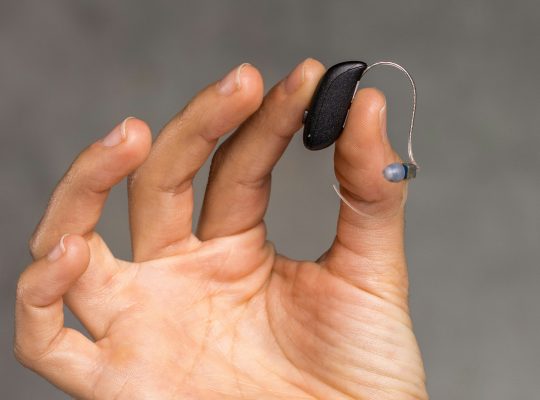Hearing aids have long ceased to be just little amplifiers that help you hear better. Nowadays, they are true mini-computers with bluetooth, apps and even direct links to your smartphone or television. Super convenient, of course, but with these technological advances also comes an obvious question: what about safety? Can you actually hack a hearing aid? And what does that mean for your privacy? In this blog, we dive into the world of hearing aids, digital threats and the measures manufacturers are taking to protect you and your hearing.
Hearing aids anno now: tiny high-tech computers
Anyone who thinks a hearing aid only amplifies sound is now a few years behind. Modern hearing aids are equipped with:
- Bluetooth connectivity for pairing with phones, laptops or TVs
- Apps that let you adjust settings or find your hearing aids if you lose them
- Automatic updates installed wirelessly
- Advanced sensors that record not only sound, but sometimes also motion
With all those smart features, a hearing aid is actually more like a mini-sized smartphone that you wear in your ear all day. And where there are smart devices, there are also hackers who see opportunities.
Is it theoretically possible to hack a hearing aid?
The honest answer: yes, in theory it can. Anything that communicates wirelessly, whether via bluetooth, Wi-Fi or other signals, has a potential vulnerability. For example, a hacker could try to access the connection between your smartphone and your hearing aid.
But let’s also immediately reassure you: the chances of someone actually hacking your hearing aid are extremely low. Why? Because:
- Hearing aids usually use short-range connections (bluetooth). So you have to be physically close to be able to do something.
- Most hearing aids have encrypted connections, just like your phone or laptop.
- It is simply of little interest to hackers. You cannot extract bank or credit card information from it.
What could go wrong in a hack?
Suppose someone does get access to your hearing aid, what could happen? Here are a few scenarios:
- Adjusting settings: making sound louder or softer, or disturbing beeps. Annoying, but not a disaster.
- Listening to conversations: in theory, someone could listen in through the microphone of a hearing aid. However, this is technically very complicated and virtually impossible due to the security that manufacturers apply.
- Privacy leak via apps: a more realistic scenario is that a bad or insecure app leaks data. Think information about your hearing, your location or your usage patterns.
So the biggest risk is not so much in the hearing aid itself, but in the apps and links around it.
What about privacy?
Hearing aids collect a lot of data. Consider:
- How often and for how long you use them
- Which settings you choose
- Sometimes even location data, if you use a “find my hearing aid” feature
That data can be useful to you and your hearing care professional, but also sensitive if it gets into the wrong hands. Imagine if an insurance company were to gain access to information about your hearing loss – you don’t want that.
Fortunately, medical data in Europe is covered by the AVG (General Data Protection Regulation) and manufacturers and audiologists must handle your data with care.
What are manufacturers doing to protect you?
Most major hearing aid manufacturers pay close attention to security. For example, they use:
- Encryption: encryption of data so no one can just listen in
- Regular updates: which close vulnerabilities as soon as they are discovered
- Safe apps: those verified by official app stores
- Secure protocols: for bluetooth communication
They are also increasingly investing in cybersecurity because they know that hearing aids will only get smarter in the future.
What can you do yourself?
Although the chances of your hearing aid being hacked are slim, you can take some precautions yourself:
- Keep your software up-to-date – always install the latest updates for your hearing aid and its app.
- Use only official apps – download apps from the manufacturer through the official App Store or Google Play.
- Pay attention to your smartphone security – many threats come not through the hearing aid itself, but through your phone. So make sure you have a good PIN, fingerprint or facial recognition.
- Turn off bluetooth when not in use – not only good for your battery, but also for your safety.
- Be aware of your data – look in the app to see what is being stored about you and decide if you are okay with that.
Are hearing aids safer than other devices?
Actually, they do. Compared to, say, smart speakers, security cameras or even your smart refrigerator, hearing aids are often less attractive to hackers. There is simply less to get at. Moreover, security is usually tighter precisely because they fall under medical devices and thus have additional regulations.
The future: even smarter, even safer
Hearing aids are only getting more sophisticated. Consider:
- Link directly to smartwatches or health apps
- AI that automatically analyzes your listening environment
- Cloud storage for hearing data
All these developments also mean that attention to security and privacy should only increase. Fortunately, manufacturers and regulators are keen on this.
Summary
Can you hack a hearing aid? Theoretically yes, but practically, the chances are very small. The biggest risks are in apps and connected devices rather than in the hearing aid itself. Still, it’s good to be aware of the data being collected and make sure your own devices are secure.
In short: feel free to enjoy all the smart features of your hearing aid without fear of someone entering your ear without an invitation. But as with all technology, a little digital hygiene doesn’t hurt.








